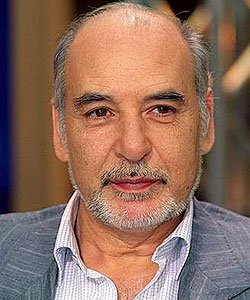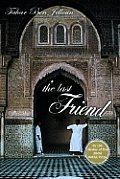
 The Last Friend by Tahar Ben Jelloun is translated by Kevin Michael Cape and Hazel Rowley. The book is published by New Press.
The Last Friend by Tahar Ben Jelloun is translated by Kevin Michael Cape and Hazel Rowley. The book is published by New Press.The Last Friend, was the winner of the 2004 International Dublin/IMPAC award, is a Rashamon-like tale of friendship and betrayal set in twentieth century Tangier. Written in Ben Jelloun's inimitable and powerfully direct style, the novel explores the twists and turns of an intense thirty-year friendship between two young men struggling to find their identities and sexual fulfillment in Morocco in the late 1950s, a complex and contradictory society both modern and archaic. From their carefree university days through their brutal imprisonment and ultimate release, the two rely on each other for physical and psychological survival, forging bonds not easily broken. Each narrator tells his version of the story, painting a vivid portrait of life lived within and in opposition to the moral strictures of North Africa. Set against a backdrop of repression and disillusionment, The Last Friend is a tale of loss of innocence and a nation's coming of age.
Here is a review that appeared in the San Francisco Chronicle. The reviewer is John Freeman is the president of the National Book Critics Circle.
What a strange and delicate flower is male friendship. Grant it too much sun and water, and you grow something soggy or overheated. Ignore it entirely and you rarely wind up with a desert rose.
In his latest novel, "The Last Friend," Moroccan-born writer Tahar Ben Jelloun explores this dilemma with the tale of a friendship that suddenly dissolves. For 90 pages, we hear from Ali, who searches his past to explain why his friend Mamed suddenly scorned him. Then we learn from Mamed the poignant source of their breakup. Something about this setup provokes the obvious question: Were they lovers? The answer is no, but as Ben Jelloun presents the relationship, the issue is rather beside the point.
The two men meet as boys in the Moroccan port city of Tangiers in the late 1950s and fall into a fast friendship. They trade sex stories and film magazines, jibe each other gently about their backgrounds. They also meet just before girls become their primary occupation. This is an important distinction, for it sets up the betrayal -- or at least the impression of one -- that gnarls so many male friendships, without making them necessarily homosexual. "I fell in love," Ali remembers, "which bothered him.
Her name was Zina; she was dark and sensuous. For the first time it occurred to me that he might be jealous of me." But as it turns out, Mamed wasn't jealous. In fact, he was probably just preoccupied. To hear his version of events, the two boys were comrades in a winner-take-all race for female virginity. "Girls willing to have sex were rare," he recalls, "we knew about them only because they already had a steady boyfriend or were in their last year of school. They came to school wearing makeup and perfume. We watched them from a distance making lewd comments."
Readers who come to this novel under the impression that stories from the Muslim world will be prudish or full of allusion are in for a surprise. This is a sexy, racy novel, energized -- for a long stretch -- by its two protagonists' frantic search for a girl who doesn't prefer sodomy to vaginal intercourse. None of their prospects wants to break her hymen.
Though it might be new territory for some of his readers, this is not necessarily new material for Ben Jelloun. Since he made his fiction debut in 1973 with "Harrouda," a novel about a fallen prostitute in the city of Fez, where Ben Jelloun was born, he has been interested in the way we negotiate our identities through desire.
In "The Sand Child," he told the story of a man so desperate to have a son that he names his eighth child, a girl, Ahmed, and says she is a boy. "The Sacred Night," which won the Prix Goncourt in 1987, continued Ahmed's story as she suffers a convoluted pathway to adulthood. "The Last Friend" is a more conventional story by comparison, but it still has the power to shock. Ali and Mamed have masturbation contests and go to prostitutes to slake their urges. Ali watches in horror as his lady of the night removes her dentures. When the time comes, they marry and start families. Only one of them stays faithful to his wife.
In this sense, "The Last Friend" is primarily a novel about the replacements that can sour a friendship. There is a bond that develops among men who share this period of frantic sexual exploration, and it is powerful indeed -- almost more powerful than prisons, which both characters endure during a crackdown on leftist students.
But there is a second wedge driving this friendship apart, and it has to do with nationality. After university, Ali moves to a coastal town and teaches while Mamed emigrates to Sweden, where he finds a clean and modern country of respectful people. "Arriving in Sweden from Morocco, the first thing you notice is the silence," Mamed notes. "It's a silent culture, without disruption or disorder. ... Their silence, the whiteness of their skin, their clear eyes and distant look, their gestures, their routine pleasures, and their respect for rules. ... I discovered a culture of individuals!"
Yet for all the benefits Mamed gleans from his adopted country, a part of him dies there, too. Ali isn't just a connection to Morocco but to a particular Morocco, a place of the very ancient past. "Seen from Tangier, Fez appeared to be a city beyond the reach of time," Ali says, describing his hometown at one point. "Nothing, nothing absolutely had changed since the day it was built. Its beauty lay in relationships to time." Nations and individuals move forward in syncopated fashion -- until sometimes the leap forward is so great that the only thing to do is break with the past. With this sour, sweet tale of two men looking at each other across this divide, Tahar Ben Jelloun shows how what tumbles into the breach is sometimes our closest friendships.
Tags: Morocco Fes Maghreb literature

1 comment:
I've been struggling to understand and describe what I've found here in Belgium, after the informality of New Zealand and the friendly chaos of Istanbul ... an extract from the book almost captured it. Thanks for writing the book up ... perhaps I understand a little more about the people I've found here in this culture. Not Swedish but not dissimilar in some things.
"Arriving in Sweden from Morocco, the first thing you notice is the silence," Mamed notes. "It's a silent culture, without disruption or disorder. ... Their silence, the whiteness of their skin, their clear eyes and distant look, their gestures, their routine pleasures, and their respect for rules. ... I discovered a culture of individuals!"
Post a Comment